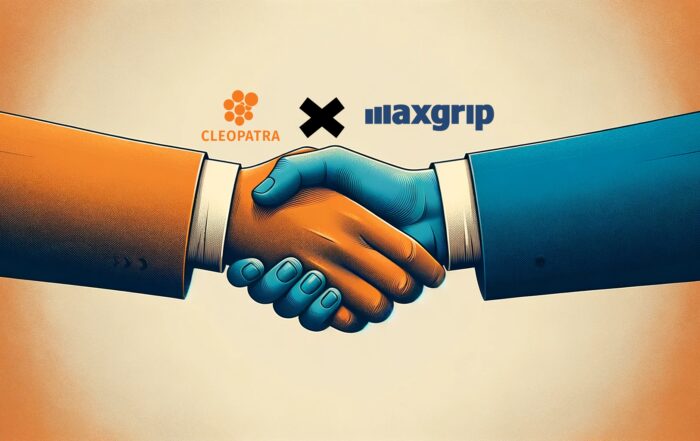The asset management industry is continually evolving, underscoring the importance of evolving alongside it to maintain a competitive edge. In just a few weeks, we are thrilled to collaborate with Industrielinqs to host iMaintain24, an event focused on the ’Asset Management Team of 2030’. This forward-looking event will feature insightful talks by industry leaders from Heineken, Shell, Nobian, Vopak and Huntsman. These leaders bring a wealth of experience into the asset management field. In preparation for the event, we held a virtual round table with four MaxGrippers on the topic to learn their views.
Data Driven Team
Mark Mulder, CEO of MaxGrip notes, “The frontrunners in the market will establish teams that are more data driven,” highlighting a shift to roles focusing on data for continuous improvement. Data savvy consultant Esli Neve predicts a move “from preventive maintenance to predictive maintenance,” requiring roles in data analysis and quality. Senior consultant Ernstjan Meinen sees traditional roles evolving with a stronger focus on IT/OT data from connected assets, and management roles increasingly utilizing data science. Cristina Gomez, consultant and student of data science foresees the addition of “AI-based predictive maintenance specialists” and “Sustainability Integration Officers,” the former refining AI systems for maintenance and the latter aligning asset management with sustainability goals. Overall, the team will integrate traditional functions with advanced data and sustainability roles, marking a significant evolution in asset management responsibilities and skills.
Required Skills
The ideal Asset Management (AM) Team of 2030 will require a diverse set of skills and backgrounds, distinct from those prevalent today. Ernstjan points out the necessity for more IT/OT and data science skills. He stresses that everyone in the team must understand “Predictive and Prescriptive maintenance and digital twins,” and how to integrate these technologies into their daily work. Mark calls it the need for “Tech savvy people”. This combined with engineering knowledge is needed to bridge gaps between asset management, analytics, and IT teams. He therefore notes the growing importance of communication skills. Esli observes a shift from a strong affinity with machines to a need for expertise in computer science, software engineering, and data science. Cristina adds that the Asset Management Team of 2030 will need advanced data analysis and IoT system management skills, particularly for roles like AI-based predictive maintenance. She also highlights the value of professionals from IT, environmental science, and behavioral economics, bringing a comprehensive approach to asset management that blends technology, environmental considerations and strategic business planning.
Technology and Processes
The team of the future will rely on a range of critical technologies, tools, systems and processes. Ernstjan emphasizes the continued importance of EAM systems and operations tools, noting, “critical systems will still be the EAM systems and systems used by operations.” He also highlights the need for
tools that integrate IT/OT data and show live asset health. Mark sees a supporting role for advanced technologies, stating, “Generative AI is helpful as support,” but underscores the necessity of combining it with human checks and domain knowledge. He believes the integration of VR, robots, and drones will also be significant, necessitating a balance between tech trust and human involvement. Cristina focuses on the importance of predictive analytics and IoT, alongside emerging technologies like AR and VR for training and maintenance. The vital role of sensors is highlighted by Esli: “The sensors provide data for predictive maintenance and the need for upgraded data communication protocols within factories.”
Preparing for the Future
To prepare their team for 2030, asset owners must adopt a multifaceted approach. Cristina emphasizes the importance of continuous learning in technologies and sustainability, alongside developing leadership and strategic thinking skills. She suggests that building capabilities in data-driven decision-making will be crucial for leveraging advanced analytics in strategic asset management. CEO Mark advocates for strategic workforce planning, recognizing the need for new roles and the integration of younger talent to boost performance. He also stresses the importance of external orientation, suggesting collaborations with expert companies to stay ahead of competition and maintain an up-to-date ecosystem. Esli points out the necessity of providing resources for self-development in competencies relevant to 2030, ensuring the team is well-equipped for future challenges. “Start as soon as possible and with small steps” is the advice that senior consultant Ernstjan gives. “Identifying critical machines for sensor placement and conduct pilot projects.” He highlights the need for effective software and connections between systems and training in data-driven maintenance strategies. He also recommends a clear plan known throughout the organization, outlining goals for 2030 and steps for each year leading up to it, to ensure a cohesive and informed approach towards future asset management. Cristina and Ernstjan both add that the human element is crucial in succeeding. As Cristina aptly : “Encouraging a culture of collaboration and ongoing learning will position any team well for future developments in the field.”
In Conclusion
The transforming landscape of asset management demands teams that are not only data-savvy but also equipped with diverse skills in IT, engineering, and sustainability. Key areas such as predictive maintenance, AI integration, and IoT management, coupled with the development of soft skills like strategic thinking, communication and collaboration, will be essential. The alignment of these elements, along with a commitment to continuous learning and adaptation, will be crucial for asset management teams to thrive in the future. Industry leaders from Heineken, Shell, Nobian, Vopak, and Huntsman will further enrich these insights with their invaluable views during the iMaintain24 – Powered by MaxGrip event.
Get inspired
Cleopatra Enterprise and MaxGrip announce a strategic partnership to enhance Turnaround Management. This collaboration combines Cleopatra's cost engineering software with MaxGrip's Asset Performance Management expertise, aiming to optimize Shutdowns, Turnarounds, and Outages (STO) for clients worldwide.
Download our whitepaper to learn the key insights for implementing a successful preventive maintenance program.








